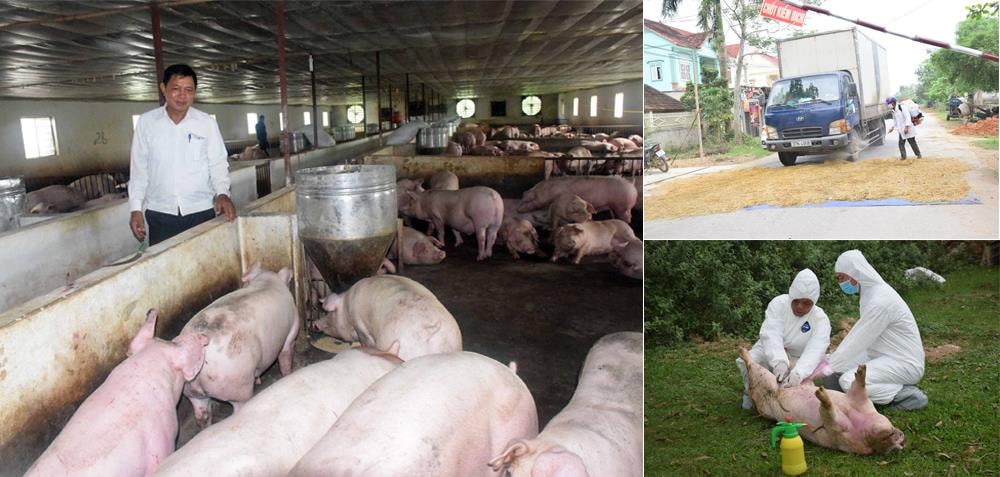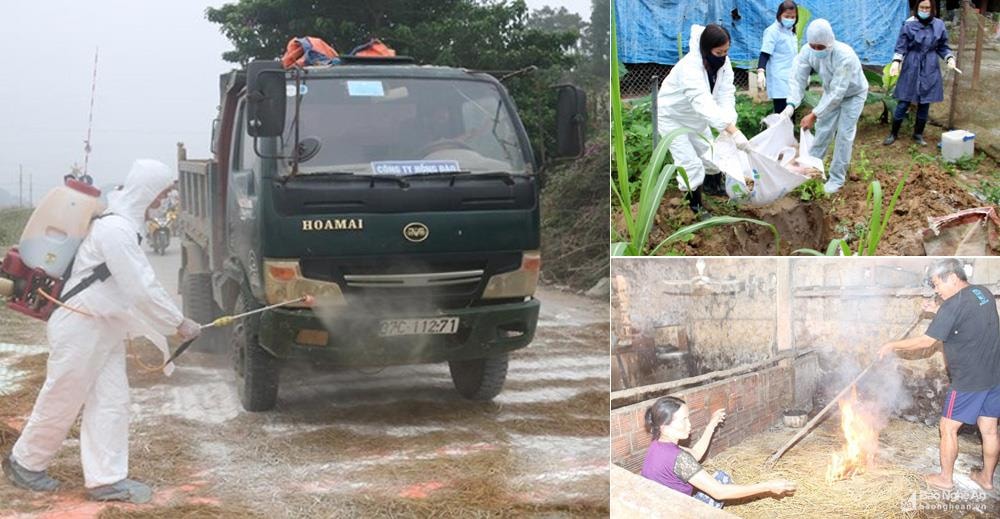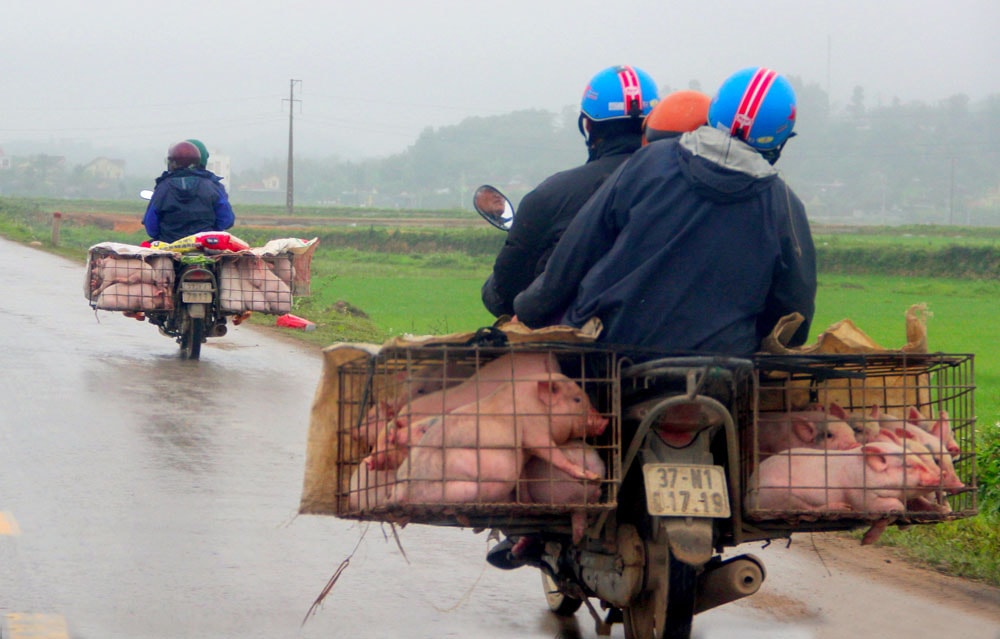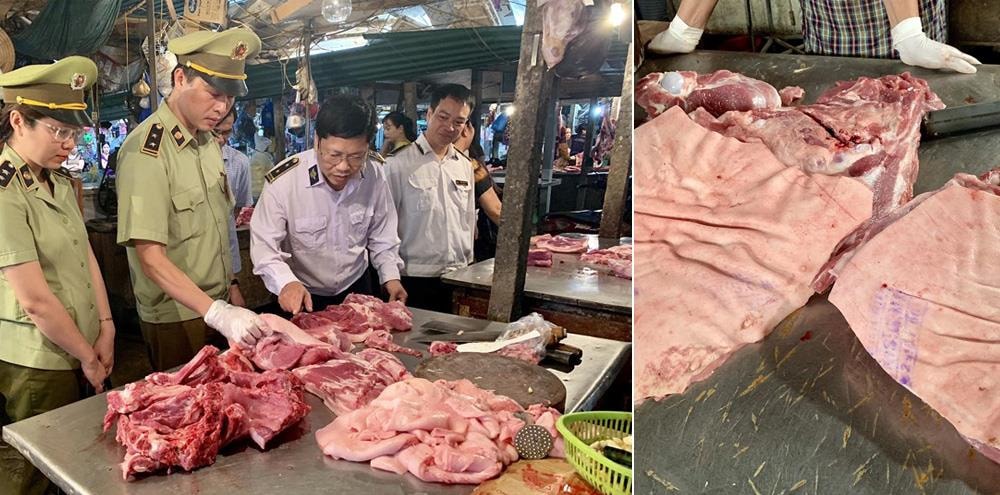Strictly handle households that slaughter and sell uninspected pork
(Baonghean.vn) - While the authorities and localities are "straining" to fight the epidemic, the situation of people slaughtering pigs and selling pork products without veterinary quarantine is still very common. Nghe An Newspaper interviewed Mr. Hoang Nghia Hieu - Director of the Department of Agriculture and Rural Development about this dangerous situation.
PV:Sir! How is the African swine fever (ASF) situation in Nghe An province so far?
Mr. Hoang Nghia Hieu:According to the announcement of the Department of Animal Health, currently there are 22 provinces nationwide with ASF (Hoa Binh province has declared the epidemic over). The total number of pigs infected and destroyed is over 160,000 pigs of all kinds.
In Nghe An, ASF has appeared in 9 households of 7 communes in 6 districts. The total number of infected pigs has been culled to 161, mainly 107 pigs for meat, the rest are sows and piglets. Of which, up to now, Quynh My commune (Quynh Luu) has gone through 1 month without new cases, the latest outbreak was on April 9 in Quy Hop district.
Currently, the situation of ASF in the country as well as in the province is very complicated. The disease tends to spread in a "leapfrog" manner and has now begun to penetrate into livestock farms.
 |
African swine fever spreads "leapfrog" and begins to penetrate into farms. Photo: PV |
Pathogens spread and infect through direct contact between sick and healthy pigs, through uncontrolled transportation of pigs and pig products from one region to another, food contaminated with pathogens, and non-compliance with biosafety farming methods...
Nghe An has implemented anti-epidemic measures according to Decision No. 812/QD-UBND dated March 19, 2019 on approving the emergency response scenario for ASF. The Department of Animal Husbandry and Veterinary Medicine has provided 10,000 liters of disinfectants to disinfect the livestock environment and more than 700 liters of anti-epidemic chemicals.
 |
Localities deploy measures to prevent the spread of African swine fever. Photo: PV |
PV:In fact, in recent times, in most localities in the province, people still arbitrarily slaughter and sell pig products in small quantities without quarantine. What risks does this pose to the spread of disease in the whole province?
Mr. Hoang Nghia Hieu:People arbitrarily slaughtering pigs on a small scale, not bringing them to centralized slaughterhouses, and selling pork products without being controlled by the Veterinary Department makes the disease spread and difficult to control, thereby increasing the risk of the disease spreading widely.
This case will be subject to administrative sanctions in the veterinary field according to the provisions of Decree No. 90/2017/ND-CP. Depending on the level of violation, there will be different forms of sanctions.
PV:Currently, what legal documents regulate sanctions for those violations, sir?
Mr. Hoang Nghia Hieu:There are many legal documents regulating veterinary hygiene and food safety in the business and slaughter of pigs and pig products such as: Veterinary Law No. 79/2015/QH13 dated June 19, 2015; Food Safety Law No. 55/2010/QH12, Decree No. 15/2018/ND-CP dated February 2, 2018 of the Prime Minister detailing the implementation of a number of articles of the Food Safety Law; Circular No. 09/2016/TT-BNNPTNT dated June 1, 2016 regulating slaughter control and veterinary hygiene inspection; Decree No. 90/2017/ND-CP regulating administrative sanctions in the veterinary field...
Accordingly, the responsibilities of the People's Committees at district and commune levels and specialized veterinary agencies at district level are specifically regulated in each field such as: managing the activities of centralized slaughterhouses; preliminary processing, processing, transportation, trading of animals, animal products and veterinary hygiene in the area; directing and organizing inspections and checks of veterinary activities...
 |
Transporting breeding pigs for sale on Highway 15. Photo: PV |
For acts of slaughtering, transporting and trading animals and animal products not in accordance with regulations, according to Decree No. 90/2017/ND-CP, the penalty ranges from VND 6,000,000 to VND 12,000,000, or a fine of 60 - 70% of the value of animal products but not exceeding VND 50,000,000 depending on each act.
Additional penalties will be confiscation of exhibits; remedial measures include forced destruction, forced veterinary hygiene inspection, destruction or heat treatment to change the purpose of use of animal products...
PV:What recommendations do you have for livestock farmers and consumers at the present time, both to prevent the spread of disease and to create a stable and safe pork consumption market, helping the livestock industry stand firm and continue to develop?
Mr. Hoang Nghia Hieu:Farmers need to apply biosafety farming methods, focusing on disease prevention from afar such as: buying pig breeds of clear origin, vaccinated with all required vaccines, quarantined, periodically monitored for infectious diseases and having negative results.
Barns must be built with a system to treat manure and wastewater; regularly disinfect, sterilize, treat the environment, livestock equipment, and compost; limit or prohibit outsiders from entering the livestock area; have measures to destroy and prevent insects, rats, or other animals from entering the livestock area.
 |
Authorities inspect pork trading activities at Vinh market. Photo: Vo Huyen |
Implement 5 no's (no hiding epidemics; no buying, selling, transporting sick or dead pigs; no slaughtering or consuming sick or dead pigs; no dumping pigs into the environment; no using unheated leftover food). Livestock farming must follow the planning and be reported to local authorities and specialized agencies for monitoring and supervision. Strengthen monitoring of pig herd health; if there are any abnormalities, immediately report to veterinary staff and local authorities for timely handling.
For consumers, although it is dangerous for pets, according to experts, DTLCP does not cause disease in humans, so consumers should not be afraid or boycott the product. To ensure safety, consumers should eat cooked food, drink boiled water and buy meat from establishments that meet food safety and hygiene conditions.
PV:Thank you!


